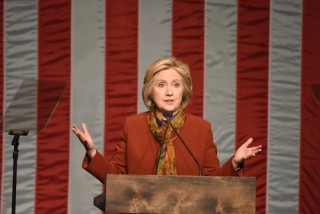 Judicial Watch, the watchdog group currently involved in a FOIA lawsuit involving Hillary Clinton‘s emails, released a transcript of the deposition of Stephen Mull, who became Executive Secretary at the State Department in June 2010, while Clinton was Secretary of State. Based on his testimony, it would seem that Mull doesn’t remember a lot from that point in time. In fact, throughout the June 3 deposition, nearly every time he was asked about Clinton’s emails, Mull said he didn’t remember.
Judicial Watch, the watchdog group currently involved in a FOIA lawsuit involving Hillary Clinton‘s emails, released a transcript of the deposition of Stephen Mull, who became Executive Secretary at the State Department in June 2010, while Clinton was Secretary of State. Based on his testimony, it would seem that Mull doesn’t remember a lot from that point in time. In fact, throughout the June 3 deposition, nearly every time he was asked about Clinton’s emails, Mull said he didn’t remember.
For instance:
A I — it’s a difficult question to answer because I — you’re asking when did I become aware she was using a private e-mail address for official government business?
Q Yes.
A I — I don’t know that I’ve ever really become aware of that. I certainly am aware of the news articles and the allegations that have been made to that effect. But I — I — you know, I’m not in a position to judge what — whether it was official government business or not.
Mull was then confronted with an email he sent to Clinton’s chief of staff, Cheryl Mills, that said, “Separately, we are working to provide the Secretary per her request a Department issued Blackberry to replace her personal unit which is malfunctioning (possible because of her personal email server is down [sic].” When he was then asked, “At this point is it fair to say that you knew that Mrs. Clinton was using a personal e-mail server?” Mull said, “Yes, I suppose you could say that, uh-huh.” But as far as any other details? Mum’s the word.
Q Do you know how you learned that?
A I — I can’t recall, no.
Q Do you recall when you learned that?
A No. I can’t recall.
Mull continued the silent treatment when discussing FOIA and record retention responsibilities.
A At any point did you take any actions to ensure that Mrs. Clinton understood her records preservation and retention responsibilities?
MR. MYERS (State Department attorney): Objection. Exceeds the scope of authorized discovery.
Q You may answer the question.
A I don’t recall doing so, no.
He also dodged any responsibility as far as informing Clinton or her staff members about their responsibilities under FOIA and the Federal Records Act. We added the parenthesis for clarification.
Q Why didn’t you make sure they understood their requirements (THROUGH FOIA, RECORDS RETENTION) while you were Executive Secretary?
MR. MYERS: Objection. Asked and answered, and beyond the scope.
Q You may answer the question.
A Again, I had no reason to believe that they were unaware or were not complying.
Mull wouldn’t even say whether it was a mistake or not to make sure Clinton was informed of proper procedure.
Q Sitting here today, do you believe it was a mistake not to confirm with Mrs. Clinton that she understood her record-preservation requirements?
MR. MYERS: Objection. Beyond the scope of authorized discovery, and calls for speculation.
Q You may answer the question.A Yeah, I — I — I think it’s difficult with hindsight to say something was a mistake, if a person didn’t have the knowledge at the time of what was going on. So I’m afraid I can’t answer the question.
Of course this seems to be in contradiction with this exchange:
Q If you had known that Mrs. Clinton was using non-State.gov e-mail account to conduct official government business, would you have instructed her not to do so?
MR. MYERS: Objection. Vague, calls for speculation.
Q You may answer the question.
A I typically avoided instructing Secretaries of State to do anything. But if I had become aware, if I were aware that any Secretary of State while I was serving as Executive Secretary were not aware of responsibilities, I — I would have taken steps within my power to inform them …
Also interesting, was Mull’s admission that he himself used personal email for business, on occasion.
Q Did you use a personal e-mail account to conduct official government business when you were Executive Secretary?
MR. MYERS: Objection. Beyond the scope of authorized discovery.
Q You may answer the question.
government business?
A I — is it my position today that …
Q Yes. Is that your testimony today, that
A Not — not that I recall. Well, occasionally. For example, if I were writing my work requirements on a department form, sometimes to make it easier to do it at home, I would have forwarded that. So occasionally I — I might have, yes. But principally I conducted government business through my government account.
Clinton contends that she didn’t break any rules with her private email use. It remains to be seen whether she will have to testify in this case.